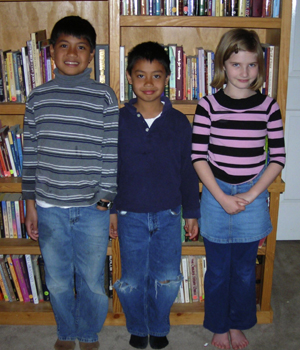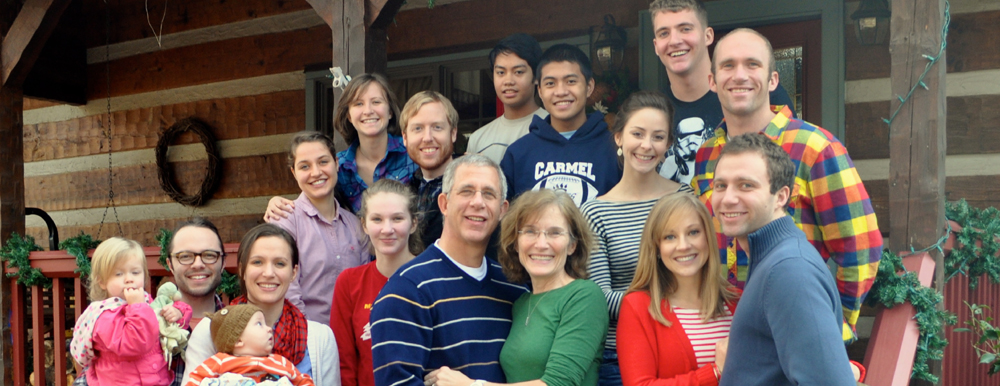Do you love children? Of course, you do. That is one of the reasons you are homeschooling. Is there a nagging thought in your head or a tugging in your heart that you should grow your family through adoption? Why in the world would you think about adopting a child when you already feel overwhelmed with phonics, multiplication tables, piano lessons, swim practices and getting enough time for yourself to maybe exercise a couple of times each week? Do you believe you are that awesome of a parent that you are going to go out looking for an even bigger challenge? I guess your birth children get along so well that, hey, what’s one more? Maybe it’s because you are meeting all of your financial goals at this point in your marriage and you have no idea what else you should do with these buckets of money? My husband, Howard, and I asked each other these questions and more back in 2003. Ok, so those weren’t quite the questions we asked ourselves. We really didn’t think we were awesome parents, or that our birth children were getting along so well, and we certainly didn’t have buckets of money sitting around. So, what were we thinking when we actively pursued adoption?
Earlier in our marriage, God had blessed us with seven birth children, so my childhood desire to adopt was shelved for about twenty-five years. After taking a rational inventory of our lives, we decided that we would instead become foster parents to newborns with a local adoption agency. (Did I say rational?) Through the course of our foster parent training, we learned that there are millions of children worldwide who have lost both of their parents. That childhood desire to adopt returned as we joyfully placed each of our foster babies into their forever parents’ arms. These babies were heading to homes of love and would have hope and a future. At forty-eight and forty-nine years old, Howard and I were not thinking of adopting a baby, but the desire to reach out to an older child was beginning to press in on our hearts.
It seemed at the time that our lives were full of blessings in every area and that, in comparison to almost every other person in the world, we were filthy rich! Were we ready to make some sacrifices for the sake of trying to love others like Jesus would? Could God have given us seven children to teach us to reach out to two brothers by birth who had no future? If we were telling our children that we were pro-life, could it also mean that we were to show them that we valued all children, not just squishy, adorable babies? In adopting, we hoped to be a blessing to the children who would become part of our family, and we hoped that in being more other-focused, we and our birth children would have more compassion for all the suffering people in the world.
 After ten months of reading books on adoption, praying, seeking advice, and filling out a mountain of paperwork, we traveled in October, 2004, for twenty-seven hours to an orphanage in the Philippines to pick up our two sons who were then nine-and-a-half and seven-and-a-half years old. We were embarking on the biggest step of faith of our lives. This commitment to become parents to these boys, sight unseen, was much more monumental than our decision to be missionaries in Kenya with our first three kids. This commitment was being made to two strangers. Yes, just like we committed ourselves to each of our sight unseen birth children, we committed to these boys, but with the knowledge that these two boys who were joining our family forever have suffered the worst trauma a human can undergo—the loss of their birth parents.>
After ten months of reading books on adoption, praying, seeking advice, and filling out a mountain of paperwork, we traveled in October, 2004, for twenty-seven hours to an orphanage in the Philippines to pick up our two sons who were then nine-and-a-half and seven-and-a-half years old. We were embarking on the biggest step of faith of our lives. This commitment to become parents to these boys, sight unseen, was much more monumental than our decision to be missionaries in Kenya with our first three kids. This commitment was being made to two strangers. Yes, just like we committed ourselves to each of our sight unseen birth children, we committed to these boys, but with the knowledge that these two boys who were joining our family forever have suffered the worst trauma a human can undergo—the loss of their birth parents.>
Along with losing their birth parents, when we adopted them, they also lost all their friends and house parents. They left behind a mangy dog with puppies. Yes, they left behind poor health and dental care, no education and the prospect of being back on the street when they turned sixteen years old, but they also completely left their country with its sights and smells, its language and traditions. How their losses would later impact each of us, we could not even imagine. Unless we have been adopted internationally, we have no idea what this is like.
When our boys came home to live with us, they were expecting Disneyland. The orphanage had used the television to pacify them, filling them up with Disney movies and American TV shows. They were angry that they were not allowed everything they wanted at stores (“Americans have everything they want”) and were incredulous that they would have to do chores like the rest of our kids. Not knowing whether this huge stash of food in our fridge and pantry would be there the next day, they hoarded food in their rooms. Along with having fairytale expectations, they did not expect to have to do any schoolwork. Period. Were they ever in for a shock!
We chose to homeschool our two new sons primarily because we had been homeschooling our birth children since they were born. Homeschooling encompassed education, parenting and spiritual discipleship for us. In 2004, we still believed that if we “did a good job” as homeschooling parents, we would not have to deal with rebellious teens and would be able to see all of our children become productive, educated and compassionate Americans, who loved Jesus and wanted to live for Him. In addition to our outcome-based philosophy with our birth children, we identified some other reasons to homeschool our sons who had been adopted.
- Bonding with parents takes a lot of time.
Time is needed for being held, looking into our each other’s eyes, reading aloud, singing, and eating together every meal. - Bonding with siblings and our family culture takes a lot of time.
“This is the way our family does this.”
“This is what it means when we tell this joke.”
“This is the crazy way our mom hates snakes.”
“This is what we believe about God and the Bible.” - Assimilating into the US culture could be filtered through us.
The children need to learn about manners, customs and social mores. - Language learning could develop through our choice of books, etc. Our boys spoke Tagalog to each other for three months. By six months, they only spoke English, and we were able to be involved in every aspect of that learning.
- We could minimize social, emotional and sensory overload. Coming from the simple world of an orphanage in a developing country, the U.S. is extremely overwhelming.
- Homeschooling would allow us the freedom to personalize studies to each child’s interests and strengths, and give us time to help them in their weaknesses. We hoped that this showed a respect for the boys’ individuality that they had never experienced.
- We could demonstrate cultural appreciation for our sons’ birth country and culture during our studies. We had plans to learn Tagalog ourselves and have the boys involved in Filipino cultural events. As it turned out, they wanted nothing to do with the books and music that we purchased, nor would they speak Tagalog with the Filipino friends we have. This reaction to our attempt at making our sons essentially dual citizens is not uncommon, as many kids who have been internationally adopted want to be Americanized as quickly as they can.
If you are considering adopting a child beyond the baby/toddler stage, maybe you would benefit from what we have learned in our last eight years of homeschooling our sons who were adopted.
- Approach the decision to homeschool with much prayer. Many, many parenting strategies are counter-intuitive with traumatized children. What worked with your birth children won’t necessarily work with these kids.
- Some homeschool methods can be similar to what you may have done before, but everything has to be done slower. Think about a year or two of extended kindergarten-type experiences, especially if your child is learning a new language.
- Check your expectations—academically and relationally. We had read that the age that your child experienced his separation from his parent is the age that he will regress to when he is adopted, and this is absolutely true. Our almost ten-year-old became a five-year-old again, in every imaginable way. Our eight-year-old became three years old. In addition, if your child initially seems thankful and happy that he has a forever home, it almost certainly won’t last. His deep heart issues will have to be dealt with before he can reconcile his huge loss. The trauma that your child endured will make an impact on your entire family, and this in turn affects your schooling. It is harder than we expected to come to grips with the fact that the sacrifice you have been called to make in adopting an older child sometimes negatively affects your birth children.
- You may need to simulate some institutional schooling if your child was successful in a conventional school prior to joining your family. That was not the case with us.
- You need to realize that there will be power struggles. Most adopted children are survivors, so their number-one concern is for control. In addition, almost every child in the world has heard of Disneyland, but your traumatized child often thinks he deserves to live the Disney life because he has suffered so much. Unrealized fantasies can lead to anger.
- If you homeschool your child who was adopted, or even if you don’t, get support from others. There are local support groups in many cities, annual conferences, online groups, and many, many helpful books that have been written. It is very draining for you and your child to go through the mountains of adjustment that have to be climbed before he can feel like a true member of your family. Call on others!
- Finally, if you are Christians, you will need to daily remind yourselves that God has a plan for your lives and your children’s. He loves them more than you ever could. Although you may be totally committed in your beliefs that homeschooling is the best educational choice, you may have to surrender this ideal for the survival of your marriage, your mental health, your birth children’s education and your adopted child’s best interest. Yes, after six years of being homeschooled, one of our sons is enrolled in a public high school because, after an agonizing season of prayer, we realized it was what we needed to do to survive. Having him there is the death of the dream that we could happily meet all of his needs here at home, but the renewal of our hope that God is going to have His way in all of our children’s lives.
Adoption is a big commitment and the decision to adopt should be taken seriously. Homeschooling an adopted child is possible, but may have additional challenges. Doing what is best for your family, including your adopted children, takes precedence.




